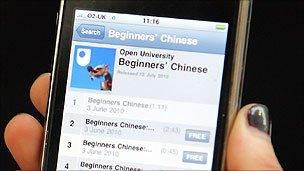Going to Harvard from your own bedroom
- Published
Imperial College in London is making its lectures available online
"In the online world you don't need to fill buildings or lecture theatres with people and you don't need to be trapped into a lecture timetable," says Peter Scott, director of the Open University's Knowledge Media Institute.
The Open University, the UK's open access university, which allows people to study from home in their own time, has been an international pioneer of degree courses online.
The university, with more than 263,000 students in 23 countries, has become a record breaker on the iTunes U service, which provides a digital library of materials for university students and staff.
Instead of music or movies, Apple's iTunes U provides a download service for lectures and resources from universities around the world.
Top universities from the Massachusetts Institute of Technology and Harvard in the US to Oxford and Cambridge in the UK have been making their materials available, with no charge to the user.
There have been 31 million downloads of OU materials, more than any other university, representing roughly 10% of all iTunes U downloads. Nearly 90% of these users are from outside the UK.
In this online era, the OU student is also getting younger. A quarter of students are aged under-25 and only 10% are aged 50 or over. That change can only be accelerated as the cost of going to university increases in many countries.
The prospect of learning from Harvard from your own bedroom is getting closer.
Grassroots colleges
But it's not the elite universities where the idea of online study is going to make its biggest impact, suggests Anthony Salcito, Microsoft's US-based vice-president of worldwide education.

Harvard v Yale: Both universities have put free course materials online to be used by anyone
"When talking to folks in places like Dubai and China I thought that the questions and the admiration would be for institutions like Harvard and Stanford.
"However, the actual part of the US education system that is most envied, that other institutions are trying to replicate, is the community college system in the US, founded on a belief that a degree and opportunity are rights for all citizens. And we have got to enable the population of students attending higher education to scale up.
"One of the things about the community college system in the US - Miami Dade College for example - is that it is very connected to employment and the workforce.
"So community colleges typically tune their degrees and their options to the jobs and opportunities of the industries that are in those communities. And that connection between employability and education is what is driving a lot of this change."
Mr Salcito also points to African villagers using the most up-to-date expertise on irrigation from MIT as an example of the consequences of universities opening up their courses and materials.
"What I am most excited about is that the privilege of going to higher education is not something that is connected to the wealthy or to the smartest or most well-equipped students for the future. It is becoming a wider social imperative."
'Self-service degrees'
But will the arrival of online degrees change the way that people study at university?
Lord Jim Knight, former education minister in England, has had a long interest in educational technology.
The type of "self-service" degrees available through the internet are one model, he says, but there are other options that could emerge, such as part-online and part-campus.
"Some people tell me we should be looking at perhaps more of an American model, where you do the first year or two of your degree from home at a community college - in the UK that could be a further education college or even at school - and you only go to finish off when you really need access to the research, your senior lecturer, your director of studies face to face.
"Until that point you can do it at distance, having peer-to-peer learning and using some of the things we are used to, like social networking, for exchanges of ideas and papers," says Lord Knight.
"Why would you go along to a university and hear someone who may or may not be the best in their field when you can go on to iTunes U and hear a lecture by the very best?
"That development of choice and access to quality, and people being digital natives, will, I think, transform things. Whether universities are yet ready to make those changes is another question."
Consumer power
At the Open University, Peter Scott says they are trying to develop services that give students exactly what they want, from face-to-face learning to the fully online experience.

Pocket-sized university: Open University courses on a mobile phone
"We can produce brilliant televisual material and get it to you on YouTube, on iTunes U or even on the web. We don't need the one-to-many model.
"Conventional universities are forced into this one-to-many, someone lecturing to a timetable, because they have buildings to fill... Our materials are designed for you to work with remotely."
While the OU delivers to its students on a range of media, the greatest excitement is being stirred by its performance on iTunes U.
High-quality podcasts and video materials are now the norm, but the number of multimedia books will soon rise to 430. Open one of these on an iPad and you can click on pictures and links to move seamlessly to videos and podcasts.
"If there's music or audio it just plays," says Mr Scott. "I'm so excited, the potential is really great."
Mr Scott agrees that universities can now market their courses globally online, and arrange for support and accreditation locally if required - franchise heaven for institutions.
So does this make "Harvard in your bedroom" more likely?
"Hey, what's Harvard? Is it a brand, is it a couple of people? Think about this. What do you really want? Do you really want to learn? Because I can tell you that the best place to do it is here. It isn't in some Ivy League university. It's right here," says Mr Scott.
Anthony Salcito says online education will be a way of opening up more choice and getting beyond the big brand names of the most exclusive universities.
"As we open up education and technology, the tyranny of the education brand will change and evolve because of the choice that students have," he says.
Merlin John is an educational technology writer and founder of agent4change.net.